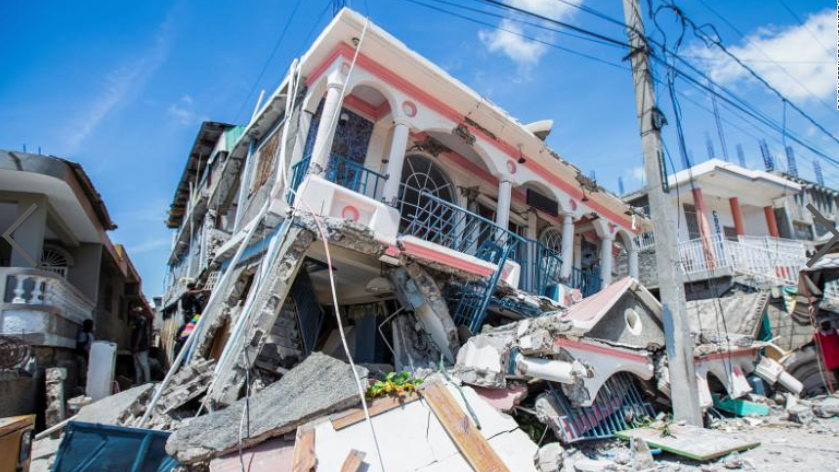
“We’re pleading for help,” Marie-Helene L’Esperance, mayor of the harbor town of Pestel, told Haiti’s Pacific Radio. “Every house was destroyed, there’s nowhere to live, we need shelters, medical help and especially water. We’ve had nothing for three days and injured victims are starting to die.”
She said the prospect of heavy rain had “spread fear through residents who had nothing left but to pray.”
The 7.2-magnitude earthquake that struck Saturday morning has killed at least 1,419 people, according to the country’s civil protection office, but that figure was expected to climb. Schools, medical centers, churches, bridges and more than 84,000 homes collapsed or were damaged in the temblor, which struck a region already battered by Hurricane Matthew in 2016.
The tragedy was the latest for the Western Hemisphere’s poorest nation — coming on top of a coronavirus outbreak, rising gang violence, an economic crisis and acute political instability after the assassination of President Jovenel Moïselast month. Haiti was devastated 11 years ago by an earthquake that reduced the capital to ruins.
On Monday, aid began to trickle in to some of the worst-hit areas. A 65-member search-and-rescue team from Fairfax County, Va., dispatched by USAID, arrived in Haiti and headed for Les Cayes, a city of about 100,000 people on the country’s southwest peninsula. UNICEF said it had sent medical kits for 30,000 people to the city, roughly 90 miles west of Port-au-Prince, the capital. The U.S. Coast Guard was ferrying injured victims to the capital.
Mexico, the Dominican Republic, Chile and other countries also sent assistance. Haitian Prime Minister Ariel Henry pledged to speed up the relief effort. “From this Monday, we will move faster. Aid provision is going to be accelerated,” he wrote on Twitter.
Elizabeth Riley, executive director of the Caribbean Disaster Emergency Management Agency, said the Haitian government was prioritizing cash donations, because supplies could be purchased in the capital and other areas not pummeled by the quake.
But aid workers expressed concern about violent gangs that have largely cut off the main road from the capital to the southwest in recent months. U.N. spokesman Stephane Dujarric said local authorities were negotiating with the armed groups to gain access, and a six-vehicle U.N. aid convoy had traveled the route without incident on Sunday.
“We do hope that roads will be increasingly be accessible and non-risky,” Muhamed Bizimana, the assistant country director for CARE, said in a phone interview from Port-au-Prince. He said the aid group’s prepositioned supplies were running low in some areas.
Violent gangs weren’t the only problem. Jerry Chandler, head of Haiti’s civil protection agency, said Colombian search-and-rescue teams that planned to travel from Port-au-Prince to the northern part of the affected area — including the port town of Jeremie — had difficulty getting through on Monday. “The difficulty is that the bridge over the Glace River collapsed,” blocking travel over National Route 7, a crucial artery, he said. The bridge was later repaired, but debris continued to block smaller roads.
In Beaumont, normally a two-hour drive south from Jeremie, residents were still waiting Monday afternoon for any signs of help, according to former mayor Alexi Faveur, a member of the community development association. He said the 31,850 residents were on their own as the rains approached.
“Eighty percent of all homes have been destroyed, and any passable road has been blocked by mudslides,” he said in a telephone interview. Outlying communities were accessible only by foot, he said.
Martinor Gerardin, mayor of L’Asile, a town of 52,000 northeast of Les Cayes, said most homes there, too, were destroyed or severely damaged. He estimated that 50 residents had been killed and 500 injured. Scores of cows and goats in the rural community had been buried under rubble, he said, threatening the inhabitants’ livelihoods. No aid from the government or nonprofit groups had arrived by Monday, he said. “We needs tents and water urgently,” he said.
Jean David Geneste , a former parliamentary deputy, called the earthquake damage “catastrophic.”
“Medical help is urgently needed,” he told Radio Caraibes. “It’s critical in the first two to four days. We have many injured with fractured limbs and need to mobilize basic materials like painkillers, bandages, braces. We have to perform urgent operations but don’t have the equipment.”
Hospitals in heavily damaged towns were overwhelmed, with patients lying on cots or mattresses outside because of a lack of space, according to photos. Lucette Gedeon, a pediatrician volunteering in the neonatal unit at the main hospital in Les Cayes, told Reuters that the facility had exhausted its supply of antibiotics and anesthesia.
“There have been babies that came in needing limbs amputated after they were trapped under the rubble,” Gedeon said.
Haiti’s health system was already fragile. Then came the coronavirus pandemic. Until last month — when the U.S. government donated 500,000 shots of the Moderna coronavirus vaccine through the Covax aid initiative — Haiti was the only country in the Americas that hadn’t received a single vaccine dose.
Among those who died in Saturday’s quake was Ousmane Touré, en epidemiologist from Guinea “who helped beat Ebola in West Africa & Congo & was deployed to Haiti for the #COVID19 response,” tweeted Tedros Adhanom Ghebreyesus, the head of the World Health Organization. He said he was “devastated” by the loss.
The earthquake pushed Haiti’s stressed hospitals to the brink of collapse.
“Basically all the health facilities are overwhelmed, all the referral hospitals are full,” said CARE’s Bizimana. “And there are still people coming in.”
Sheridan reported from Mexico City.

